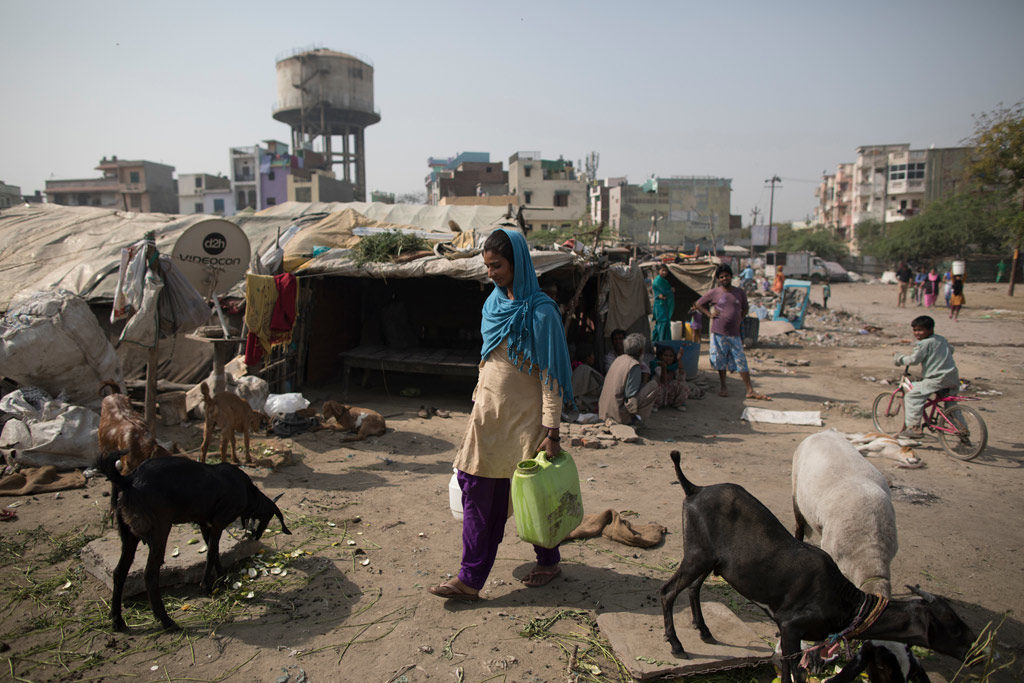
14 Jul, 2017
Billions around the world lack safe water, proper sanitation facilities: UN
2 July 2017, UN News – Some three in ten people around the world lack access to safe and readily available water at home, and almost six in ten to safely managed sanitation, a new United Nations report has warned, calling on countries to do more to fulfil these basic human needs.
 A woman carries jerrycans of water from a municipal water pipe off a main road at the outskirts of their illegal slum dwelling area called Chandmari Juggi in the Indian state of Uttar Pradesh. Photo: UNICEF/Prashanth Vishwanath |
According to the World Health Organization (WHO) and the UN Children’s Fund (UNICEF) joint report, Progress on Drinking Water, Sanitation and Hygiene: 2017 Update and Sustainable Development Goal Baselines, many homes, healthcare facilities and schools also lack soap and water for handwashing, putting the health of all people – but especially young children – at risk for deadly diseases.
“Safe water, sanitation and hygiene at home should not be a privilege of only those who are rich or live in urban centres,” Tedros Adhanom Ghebreyesus, the WHO Director-General, said in a news release, announcing the findings and noting that those living in rural areas are the worst affected.
As a result of lack of these basic services, millions fall ill to diseases – that could, otherwise, have been easily prevented – such as diarrhoea which claims the lives of 361,000 children under the age of five die, every year, noted the UN agencies.
“Safe water, effective sanitation and hygiene are critical to the health of every child and every community – and thus are essential to building stronger, healthier, and more equitable societies,” underscored Anthony Lake, the Executive Director of UNICEF.
‘Significant’ inequalities persist
Good hygiene is one of the simplest and most effective ways to prevent the spread of diseases such as diarrhoea, cholera, dysentery, hepatitis A, and typhoid.
However, findings in the report revealed that access to water and soap for handwashing varies immensely in the 70 countries with available data, from 15 per cent of the population in sub-Saharan Africa to 76 per cent in western Asia and northern Africa.
These significant inequalities also put the implementation of the Sustainable Development Goals (SDGs), in particularGoal 6 on ensuring availability and sustainable management of water and sanitation for all at risk.
Backed by the data, the two UN agencies also warned that in as many as 90 countries around the world, progress towards basic sanitation is too slow, “meaning they will not reach universal coverage by 2030”.
Furthermore, of the 4.5 billion people who do not have safely managed sanitation, 2.3 billion still do not have basic sanitation services, including nearly 600 million people who share a toilet or latrine with other households, and 892 million people – mostly in rural areas – who defecate in the open.
Improvements these services, are therefore essential not only for realizing the 2030 Agenda for Sustainable Development and giving the most vulnerable a chance at a better future.
“As we improve these services in the most disadvantaged communities and for the most disadvantaged children today, we give them a fairer chance at a better tomorrow,” said Mr. Lake.
In the same vein, Mr. Ghebreyesus underscored: “These are some of the most basic requirements for human health, and all countries have a responsibility to ensure that everyone can access them.”



Liked this article? Share it!